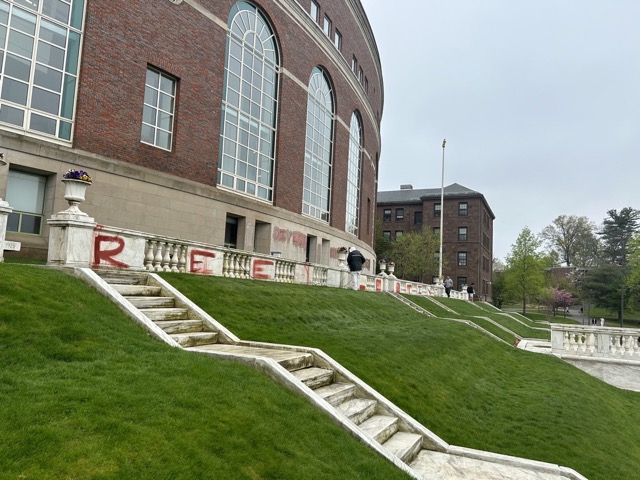
An unidentified person or group put up messages in support of Palestine and Wesleyan University divestment from Israel on the night of Wednesday, May 1 or early morning of Thursday, May 2. The messages were drawn on the south wall of Olin Memorial Library, Dennison Terrace, and the Center for the Arts (CFA). Wesleyan stated to The Argus that the administration is directing significant resources toward addressing the defacement of Wesleyan property. Wesleyan did not indicate anything about the substance that was used, but students have speculated that it is unlikely to be spray paint due to its removal process and observed physical properties.
Workers from Physical Plant were seen in the early morning on May 2 washing off the messages with power washers, concluding by 1:00 p.m. As of the publication of this article, some faint staining is still visible on Olin.
Within the last few days, chalking of Wesleyan sidewalks and buildings—including North College and Usdan University Center–has increased in the wake of the establishment of the Palestine solidarity encampment on Sunday, April 28. The encampment was organized by Students for Justice in Palestine (SJP) and has rapidly expanded, with tents now set up on Andrus Field and large crowds gathering around the site during rallies and protests.
Phrases in multiple languages, supporting Wesleyan divestment, freedom for Palestinians, and the denouncement of Israeli military action, have been chalked in locations across campus, from Fisk Hall to Freeman Athletic Center, and students have been seen re-chalking during the early morning hours.
“In addition to the legitimate expression of political views, there have unfortunately also been acts of vandalism, which the University will not tolerate,” President Michael Roth ’78 wrote in an email to the Wesleyan community in the afternoon of Thursday, May 2. “The recent defacement of University property…are serious violations of University rules and of the law. We will take all appropriate measures to hold those responsible accountable. To be clear, this may include suspension, expulsion, and legal charges.”
Roth expressed that Wesleyan would prefer to speak to protestors directly about an institutional response to the war in Gaza, citing agreements at Brown University and Northwestern University. These agreements ensure that members of pro-Palestinian student organizations will meet with their respective university’s administration to discuss divesting funds and that divestment information will be disclosed upon request.
“We have tried…to maintain an environment free of violence and harassment,” Roth wrote. “The protesters’ cause is important—bringing attention to the killing of innocent people. And we continue to make space for them to do so, as long as that space is not disruptive to campus operations.”
In a previous email sent out to the Wesleyan community on Monday, April 29, Roth proposed a route toward sustainable peace, achieved by rejecting violence and not engaging in intimidation or harassment. As long as these qualifications were met, Roth assured that Wesleyan would neither clear the encampment nor introduce Middletown police. Chalking was not referenced, but has been banned on campus since May 2003.
“All chalking happens autonomously and is not necessarily associated with the encampment,” SJP member Rowan Roudebush ’27 said in a message to The Argus. “The large-scale chalking last night is a result of widespread frustration and is preventable not by any amount [of] policing, but by disclosure and divestment from the University.”
Chalking on North College, the south wall of Usdan, and pathways leading to those buildings has not been removed thus far. According to a previous SJP Instagram post, Wesleyan groundskeepers attempted to remove this chalk work on April 29, but this attempt received student pushback.
“[The groundskeepers arrived] at 5:50 in the morning, but [students] put themselves in front of the chalk to protect it,” Roudebush said. “They stood [their] ground and chalk was safe. They got a little bit wet, but…we take care of each other.”
Wesleyan has not disclosed any information about identifying culprits or assigning consequences thus far.
Rose Chen can be reached at rchen@wesleyan.edu.
Carolyn Neugarten can be reached at cneugarten@wesleyan.edu.



Leave a Reply